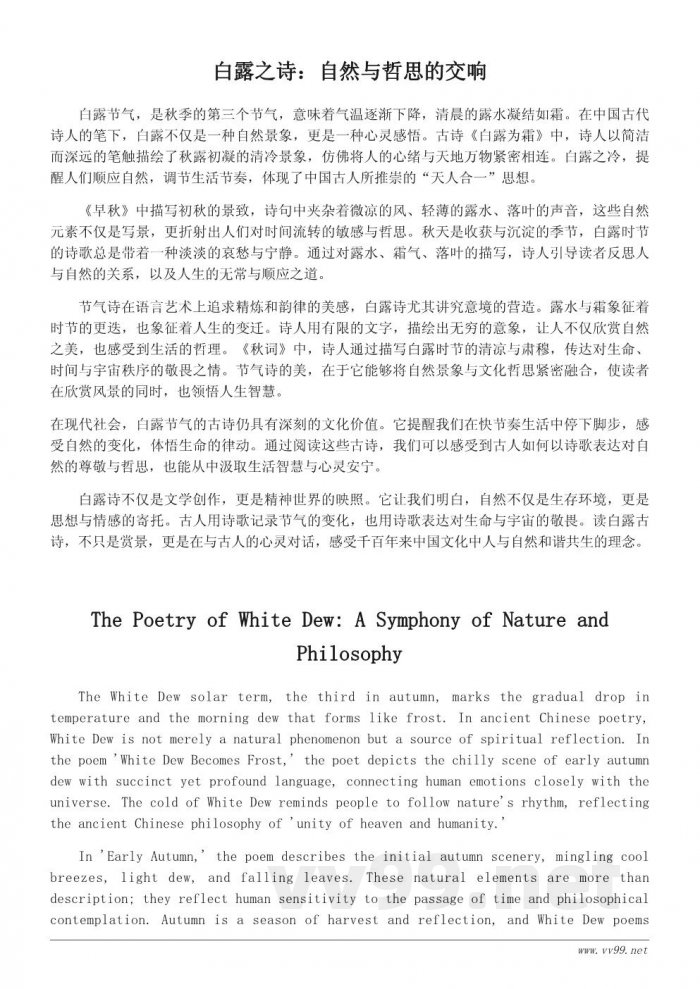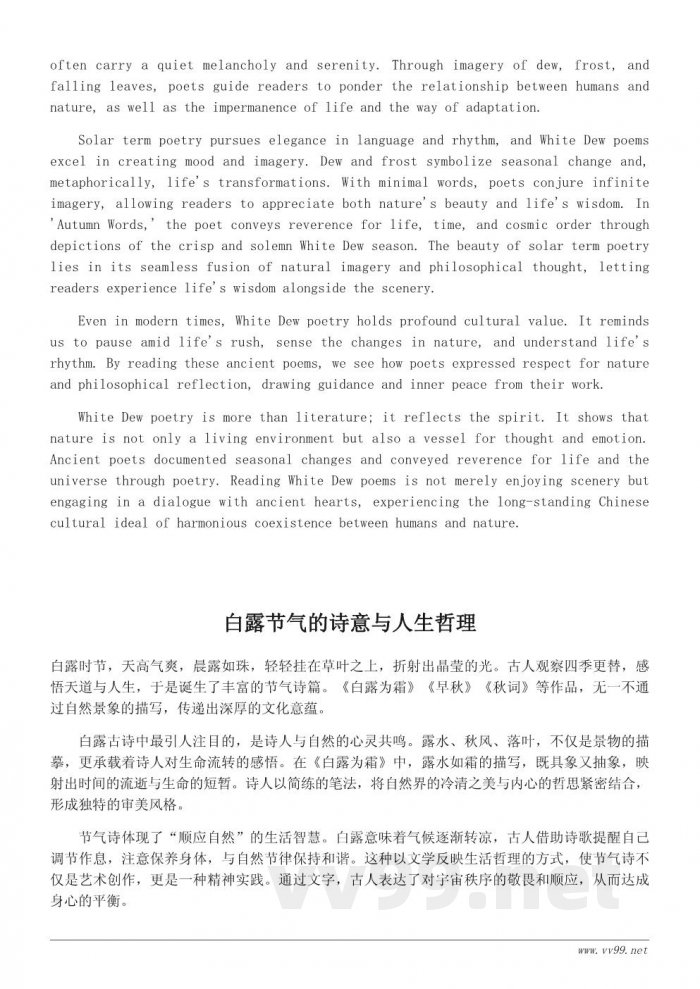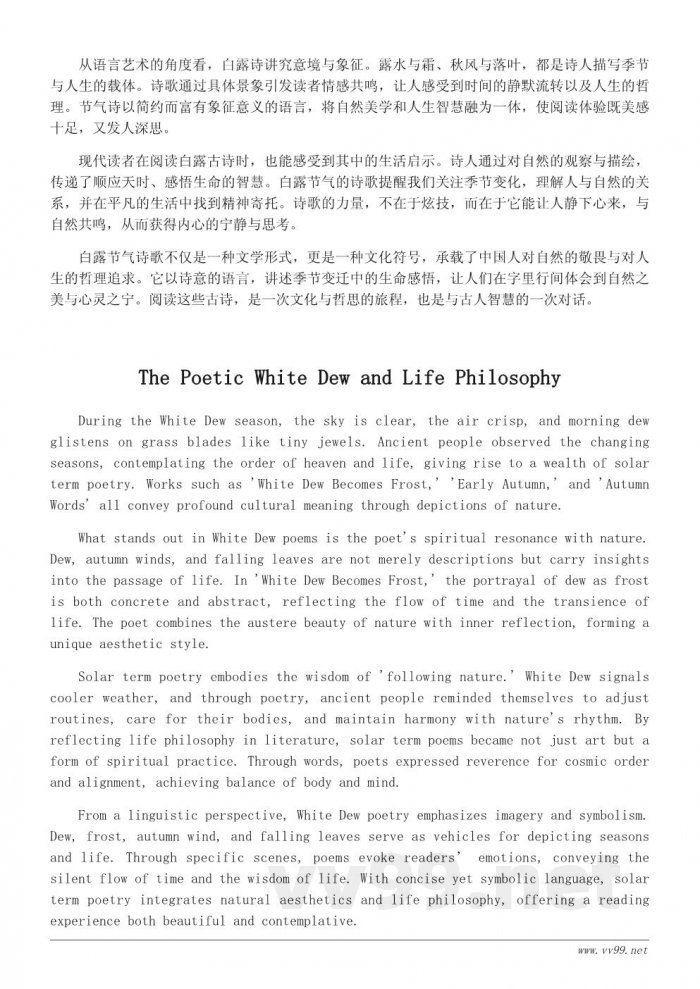白露之诗:自然与哲思的交响
白露节气,是秋季的第三个节气,意味着气温逐渐下降,清晨的露水凝结如霜。在中国古代诗人的笔下,白露不仅是一种自然景象,更是一种心灵感悟。古诗《白露为霜》中,诗人以简洁而深远的笔触描绘了秋露初凝的清冷景象,仿佛将人的心绪与天地万物紧密相连。白露之冷,提醒人们顺应自然,调节生活节奏,体现了中国古人所推崇的“天人合一”思想。
《早秋》中描写初秋的景致,诗句中夹杂着微凉的风、轻薄的露水、落叶的声音,这些自然元素不仅是写景,更折射出人们对时间流转的敏感与哲思。秋天是收获与沉淀的季节,白露时节的诗歌总是带着一种淡淡的哀愁与宁静。通过对露水、霜气、落叶的描写,诗人引导读者反思人与自然的关系,以及人生的无常与顺应之道。
节气诗在语言艺术上追求精炼和韵律的美感,白露诗尤其讲究意境的营造。露水与霜象征着时节的更迭,也象征着人生的变迁。诗人用有限的文字,描绘出无穷的意象,让人不仅欣赏自然之美,也感受到生活的哲理。《秋词》中,诗人通过描写白露时节的清凉与肃穆,传达对生命、时间与宇宙秩序的敬畏之情。节气诗的美,在于它能够将自然景象与文化哲思紧密融合,使读者在欣赏风景的同时,也领悟人生智慧。
在现代社会,白露节气的古诗仍具有深刻的文化价值。它提醒我们在快节奏生活中停下脚步,感受自然的变化,体悟生命的律动。通过阅读这些古诗,我们可以感受到古人如何以诗歌表达对自然的尊敬与哲思,也能从中汲取生活智慧与心灵安宁。
白露诗不仅是文学创作,更是精神世界的映照。它让我们明白,自然不仅是生存环境,更是思想与情感的寄托。古人用诗歌记录节气的变化,也用诗歌表达对生命与宇宙的敬畏。读白露古诗,不只是赏景,更是在与古人的心灵对话,感受千百年来中国文化中人与自然和谐共生的理念。
The Poetry of White Dew: A Symphony of Nature and Philosophy
The White Dew solar term, the third in autumn, marks the gradual drop in temperature and the morning dew that forms like frost. In ancient Chinese poetry, White Dew is not merely a natural phenomenon but a source of spiritual reflection. In the poem 'White Dew Becomes Frost,' the poet depicts the chilly scene of early autumn dew with succinct yet profound language, connecting human emotions closely with the universe. The cold of White Dew reminds people to follow nature's rhythm, reflecting the ancient Chinese philosophy of 'unity of heaven and humanity.'
In 'Early Autumn,' the poem describes the initial autumn scenery, mingling cool breezes, light dew, and falling leaves. These natural elements are more than description; they reflect human sensitivity to the passage of time and philosophical contemplation. Autumn is a season of harvest and reflection, and White Dew poems often carry a quiet melancholy and serenity. Through imagery of dew, frost, and falling leaves, poets guide readers to ponder the relationship between humans and nature, as well as the impermanence of life and the way of adaptation.
Solar term poetry pursues elegance in language and rhythm, and White Dew poems excel in creating mood and imagery. Dew and frost symbolize seasonal change and, metaphorically, life's transformations. With minimal words, poets conjure infinite imagery, allowing readers to appreciate both nature's beauty and life's wisdom. In 'Autumn Words,' the poet conveys reverence for life, time, and cosmic order through depictions of the crisp and solemn White Dew season. The beauty of solar term poetry lies in its seamless fusion of natural imagery and philosophical thought, letting readers experience life's wisdom alongside the scenery.
Even in modern times, White Dew poetry holds profound cultural value. It reminds us to pause amid life's rush, sense the changes in nature, and understand life's rhythm. By reading these ancient poems, we see how poets expressed respect for nature and philosophical reflection, drawing guidance and inner peace from their work.
White Dew poetry is more than literature; it reflects the spirit. It shows that nature is not only a living environment but also a vessel for thought and emotion. Ancient poets documented seasonal changes and conveyed reverence for life and the universe through poetry. Reading White Dew poems is not merely enjoying scenery but engaging in a dialogue with ancient hearts, experiencing the long-standing Chinese cultural ideal of harmonious coexistence between humans and nature.
白露节气的诗意与人生哲理
白露时节,天高气爽,晨露如珠,轻轻挂在草叶之上,折射出晶莹的光。古人观察四季更替,感悟天道与人生,于是诞生了丰富的节气诗篇。《白露为霜》《早秋》《秋词》等作品,无一不通过自然景象的描写,传递出深厚的文化意蕴。
白露古诗中最引人注目的,是诗人与自然的心灵共鸣。露水、秋风、落叶,不仅是景物的描摹,更承载着诗人对生命流转的感悟。在《白露为霜》中,露水如霜的描写,既具象又抽象,映射出时间的流逝与生命的短暂。诗人以简练的笔法,将自然界的冷清之美与内心的哲思紧密结合,形成独特的审美风格。
节气诗体现了“顺应自然”的生活智慧。白露意味着气候逐渐转凉,古人借助诗歌提醒自己调节作息,注意保养身体,与自然节律保持和谐。这种以文学反映生活哲理的方式,使节气诗不仅是艺术创作,更是一种精神实践。通过文字,古人表达了对宇宙秩序的敬畏和顺应,从而达成身心的平衡。
从语言艺术的角度看,白露诗讲究意境与象征。露水与霜、秋风与落叶,都是诗人描写季节与人生的载体。诗歌通过具体景象引发读者情感共鸣,让人感受到时间的静默流转以及人生的哲理。节气诗以简约而富有象征意义的语言,将自然美学和人生智慧融为一体,使阅读体验既美感十足,又发人深思。
现代读者在阅读白露古诗时,也能感受到其中的生活启示。诗人通过对自然的观察与描绘,传递了顺应天时、感悟生命的智慧。白露节气的诗歌提醒我们关注季节变化,理解人与自然的关系,并在平凡的生活中找到精神寄托。诗歌的力量,不在于炫技,而在于它能让人静下心来,与自然共鸣,从而获得内心的宁静与思考。
白露节气诗歌不仅是一种文学形式,更是一种文化符号,承载了中国人对自然的敬畏与对人生的哲理追求。它以诗意的语言,讲述季节变迁中的生命感悟,让人们在字里行间体会到自然之美与心灵之宁。阅读这些古诗,是一次文化与哲思的旅程,也是与古人智慧的一次对话。
The Poetic White Dew and Life Philosophy
During the White Dew season, the sky is clear, the air crisp, and morning dew glistens on grass blades like tiny jewels. Ancient people observed the changing seasons, contemplating the order of heaven and life, giving rise to a wealth of solar term poetry. Works such as 'White Dew Becomes Frost,' 'Early Autumn,' and 'Autumn Words' all convey profound cultural meaning through depictions of nature.
What stands out in White Dew poems is the poet's spiritual resonance with nature. Dew, autumn winds, and falling leaves are not merely descriptions but carry insights into the passage of life. In 'White Dew Becomes Frost,' the portrayal of dew as frost is both concrete and abstract, reflecting the flow of time and the transience of life. The poet combines the austere beauty of nature with inner reflection, forming a unique aesthetic style.
Solar term poetry embodies the wisdom of 'following nature.' White Dew signals cooler weather, and through poetry, ancient people reminded themselves to adjust routines, care for their bodies, and maintain harmony with nature's rhythm. By reflecting life philosophy in literature, solar term poems became not just art but a form of spiritual practice. Through words, poets expressed reverence for cosmic order and alignment, achieving balance of body and mind.
From a linguistic perspective, White Dew poetry emphasizes imagery and symbolism. Dew, frost, autumn wind, and falling leaves serve as vehicles for depicting seasons and life. Through specific scenes, poems evoke readers’ emotions, conveying the silent flow of time and the wisdom of life. With concise yet symbolic language, solar term poetry integrates natural aesthetics and life philosophy, offering a reading experience both beautiful and contemplative.
Modern readers can still glean life lessons from White Dew poems. Poets conveyed the wisdom of adapting to seasonal rhythms and appreciating life through observations of nature. White Dew poetry reminds us to pay attention to seasonal changes, understand the human-nature relationship, and find spiritual solace in daily life. The power of poetry lies not in showiness but in its ability to calm the mind and resonate with nature, bringing inner peace and reflection.
White Dew solar term poetry is not just a literary form but a cultural symbol, embodying Chinese reverence for nature and philosophical pursuit of life. Through poetic language, it narrates insights gained from seasonal transitions, allowing people to appreciate both the beauty of nature and the serenity of the mind. Reading these ancient poems is a journey of culture and philosophy, and a dialogue with the wisdom of past generations.
小提示:上面此文档内容仅展示完整文档里的部分内容, 若需要下载完整文档请 点击免费下载完整文档 。





